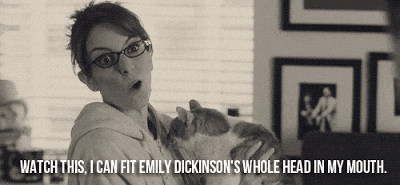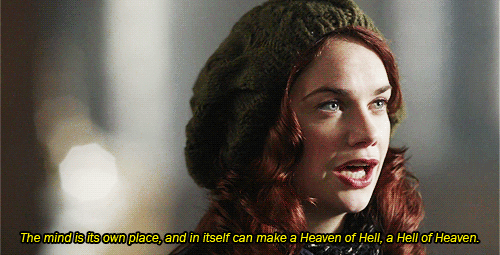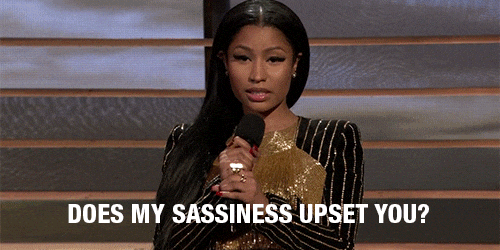Let's be honest here, people: We all feel a bit weird about Poetry. If we had a relationship status on Facebook, it'd definitely be some form of 'It's Complicated.' Yet, this semester, I chose to look past that sheen of the unknown and cryptic by voluntarily signing up for a whole course load of it. (I'm crazy, I know. Yet one cannot pass up two things when it comes to English classes: Walt Whitman and John Milton.)
So far, we (i.e. the poetry) are getting to know each other a bit more. Of course, he's always nagging for me to come do him, but I suppose that's alright because he's not too bad once you're in the thick of it.
Despite my rather concerning relationship with an art form, I'm getting along fine. Over the course of this first half I've learned many things - 6 things to be exact - and because I care about you, my faithful readers, I want to pass this wisdom on to you. You never know, you might want to take on a semester like this too.
1. John Milton is Kayne, but he's actually made it.
You heard it here first people - unless you also are in my Milton class. John Milton Jr., composer of great and timeless literature is Kayne. Except he's not. People in my class thought this was so in the beginning because Milton has a tendency to... talk about himself always. Take, for instance, the little ditty entitled "On the Morning of Christ's Nativity." Just by looking at the title you can assume that it's about Christ's birth. And you'd be right... almost. Like Kanye's famous interruption of Taylor Swift at the 2009 MTV Awards, Milton also shoves Christ out of the way to make a point. That point just happens to be himself. He is the gift here, meant for Christ, yet somehow the infant savior gets shoved to the side here and this example of our two friends is thus born.
The evidence is truly there to some extent, there's no denying that. Both are pompous, both are conceited and outspoken at times, but the key difference between the two has something to do with what we like to call the rhetoric of anticipation and arrival. Kanye says he is destined for greatness, Milton does as well in this famous speech to his peers entitled "On a Vacation Exercise at College," but there is one key difference here. Milton arrives where Kanye does not. We see this through his great work Paradise Lost. Kanye may have dope rhymes, but Milton's are better. After all, they are still being discussed 200 years later with just as much fervor.
2. Emily Dickinson is a FREAK.
Yes, you read that correctly. Emily Dickinson is a freak. Not in that, "Wow, what a weirdo. Get her away from me" way, but in that way that makes you sort of flourish your eyebrows suggestively. Yea... You know what I mean.
By looking at her, you'd never think that this quiet little mouse would've had that interesting of a sex life, but this poem says otherwise:
Wild Nights - Wild Nights!
By Emily Dickinson
Wild nights - Wild nights!
Were I with thee
Wild nights should be
Our luxury!
Futile - the winds -
To a Heart in port -
Done with the Compass -
Done with the Chart!
Rowing in Eden -
Ah - the Sea!
Might I but moor - tonight -
In thee!
I don't know about you but "mooring" the night in someone sounds freaky to me. I won't get into the specifics, but you can use your imagination there.
3. 'Paradise Lost' isn't that bad of a read.
As far as dense literature goes, Paradise Lost isn't that bad. In fact, I think it's one of the best pieces I've read over the course of my studies in English. That's saying something because this is my bread and butter, people.
Yes, it's hard to understand at times, but, as my fabulous professor likes to remind us, it's sharpening our minds. We don't just read the text, the text reads us and we come out better people because of it. We are forced to ask important, life altering questions when we read and I've never read anything that pulls me in that much. The reader is literally a character here and in my opinion, this is what makes it so timeless.
That aside, we're not even taking all of the blatant nastiness that occurs over the epic poem's twelve books (See also, "Analyze This: A Review of 'Paradise Lost' Book ll"). I'm not being cliché when I say this, but it's literally got everything: Romance, Betrayal, Action, Demented Characters. Literally, I can't stop singing it's praises! (Pun intended)
4. Poetry is sassiness in it's highest form.
Take Walt Whitman, for instance. That man is the sassiest being that has ever walked this earth and his poetry literally oozes it. He drops wisdom bombs all over the place in Song of Myself and everyone gasps in horror, but he could literally give less of a shit. And he's not the only one who does this - Dickinson does too, you just have to fish for it for a while before you can truly understand.
5. It's personal.
A poem is truly a glimpse at the inside of someone's soul. The audience can take so much from it and grow as a person just because the poet laid themselves bare. It's like sex, but less acclaimed and more acceptable in public. You can become enlightened, excited, and find a new outlook on life just by reading a great poem. And that's beautiful.
6. Words are important.
I once had a High School English Teacher who said many things that I don't remember anymore, but there is one phrase that she liked to use rather often that always struck a cord with me: "Words make your world." And you know what, she's right - especially when you're talking about poetry. Because these words aren't just thrown out on the page - they're carefully and precisely placed on a specific line in a specific order. Therefore, they mean something. If even one word was taken out of a finished poem, it wouldn't be the same - wouldn't have the same flare or meaning. When I think about it this I like to think of one of the most quotable stanzas in Paradise Lost. It's when Satan falls in Book 1 and it goes like this:
Him the Almighty Pow'r
Hurled headlong flaming from th' ethereal sky
With hideous ruin and combustion down
To bottomless perdition, there to dwell
In adamantine chains and penal fire
Who durst defy th' Omnipotent to arms.
(1.44-49.)
That's a powerful section. Those are powerful words and if any of them were substituted or weren't even there it wouldn't have the same effect and it wouldn't be a memorable stanza. I have this memorized and I put that much effort into doing that because it's one of my favorite lines of verse. The words have meaning, they change my outlook every time I read them, quote them, or write them. If they didn't have that, they wouldn't have the same effect.
As you can tell, I'm rather passionate. To be honest, the idea of not having another semester like this one saddens me. I've learned so much in just two months and I never want it to stop. I've been taken in and nurtured by this art form and I'll hate to see it go.



























